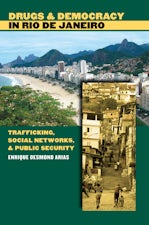Sharing This Walk
An Ethnography of Prison Life and the PCC in Brazil
By Karina Biondi
Edited and translated by John F. Collins
222 pp., 6.125 x 9.25, 3 halftones, 1 map, notes, bibl., index
-
Paperback ISBN: 978-1-4696-2340-5
Published: November 2016 -
Hardcover ISBN: 978-1-4696-3030-4
Published: November 2016 -
E-book EPUB ISBN: 978-1-4696-3031-1
Published: October 2016 -
E-book PDF ISBN: 979-8-8908-4781-2
Published: October 2016
Latin America in Translation
Buy this Book
- Paperback $29.95
- Hardcover $99.00
- E-Book $23.99
For Professors:
Free E-Exam Copies
Awards & distinctions
2017 Association for Political and Legal Anthropology Book Prize
Available for the first time in English, Biondi's riveting portrait of the PCC illuminates how the organization operates inside and outside of prison, creatively elaborating on a decentered, non-hierarchical, and far-reaching command system. This system challenges both the police forces against which the PCC has declared war and the methods and analytic concepts traditionally employed by social scientists concerned with crime, incarceration, and policing. Biondi posits that the PCC embodies a “politics of transcendence,” a group identity that is braided together with, but also autonomous from, its decentralized parts. Biondi also situates the PCC in relation to redemocratization and rampant socioeconomic inequality in Brazil, as well as to counter-state movements, crime, and punishment in the Americas.
About the Authors
Karina Biondi, the author of Junto e Misturdado: uma etnografía do PCC, holds a doctorate in social anthropology from the Federal University of São Carlos in São Paulo.
For more information about Karina Biondi, visit
the
Author
Page.
Editor and translator John F. Collins is associate professor of anthropology at Queens College and the Graduate Center of the City University of New York and the author of Revolt of the Saints: Memory and Redemption in the Twilight of Brazilian Racial Democracy.
For more information about John F. Collins, visit
the
Author
Page.
Reviews
“This elegant and rigorously argued book offers a compelling critique of existing depictions of prison life in Brazil and challenges entrenched understandings of 'organised crime.'”--London School of Economics Review of Books
“One of the most insightful works on ‘inner’ Brazilian society.”--Current Anthropology
“This is the best kind of ethnography, in which the experience of the subjects genuinely determines the ideas developed.”--Luso-Brazilian Review
“Karina Biondi’s book has the potential to transform the field of political anthropology well beyond any continental boundary. Recasting standard anthropological paradigms of politics, power, and crime, it is an ethnography of politics and political possibilities. It is also an engaging, even riveting, read. Despite the profound analyses it contains, it is written in such a clear style as to be perfectly accessible and appropriate as a key text for introductory or intermediate courses in anthropology, sociology, Latin American studies, and political science.”--Magnus Course, University of Edinburgh
“Karina Biondi’s bold ethnography . . . gives new meaning to the notion that anthropologists should work from wherever we find ourselves. . . . Biondi invites us to consider the real costs of extreme social inequality in Brazil which, alongside of the inhumanity of the criminal justice system and the de facto civil war between police and the marginal, prefigures circumstances in which an illicit, criminal organization is able to produce far more in the way of conflict management and public security than the official, 'legitimate' state.”--Journal of Latin American and Caribbean Anthropology



